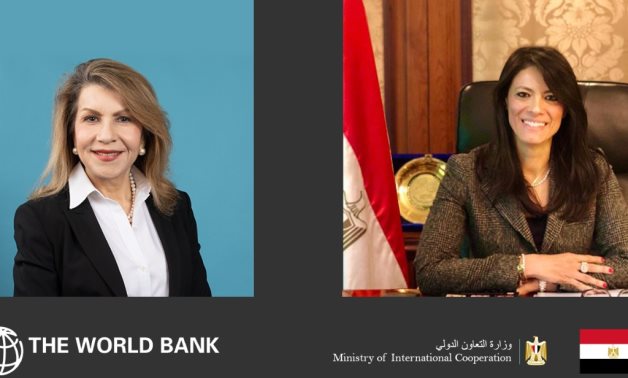
Egyptian International Cooperation Minister Dr. Rania al-Mashat and Dr. Carmen Reinhart, Vice President of the World Bank and Chief Economist of the World Bank
CAIRO - 3 October 2020: Minister of International Cooperation, Dr. Rania Al-Mashat, participated in a virtual session organized by the World Bank Group, where she referred to the importance of structural reforms and how it helped in achieving an economic recovery that is flexible and sustainable that enabled it to absorb the shocks of the COVID-19 pandemic.
The virtual meeting included four sessions featuring speakers from Johns Hopkins University, the International Association for Official Statistics, the Ford Foundation, the World Bank Group, as well as a policy panel discussion with ministers such as Minister of Planning and International Cooperation of Jordan, Wissam Rabadi, as well as Minister of Economy and Finance of Djibouti, Ilyas M. Dawaleh.
The virtual event highlighted how the pandemic has underscored the increasing importance of trust, as lack of adequate data collection and information leads to unpreparedness and greater shocks in the economy. It discussed ways to foster trust to strengthen the social contract and shrink the magnitude of crises in the coming decades.
Al Mashat noted that cooperation helps in promoting exchange of experiences and expertise, as Egypt and other countries learned by doing among the international community the constant monitoring of COVID-19 cases and regular communication on the country’s efforts to contain the virus.
She added that there is a commitment by Egypt towards transparency and data collection, most evidently seen by the state’s decisions to provide cash transfers to informal workers, which helped register over 1 million workers and shift them from the informal to the formal labor force.
Al Mashat also drew attention to the efforts made by the Ministry of International Cooperation inn strengthening economic diplomacy with development partners through its three principles: regularly organizing multi-stakeholder platforms, the Global Partnerships Narrative: People&Projects&Purpose, and mapping ODA financing according to the sustainable development goals.
Dr. Carmen Reinhart, Vice President of the World Bank and Chief Economist of the World Bank, said that the global economic situation faces great challenges that surpass the global financial crisis that occurred in 2008, and that the economic repercussions are still ongoing, referring to the role of the World Bank Group In achieving multilateral cooperation to enhance economic growth and help countries out of the current crisis.
For his part, Farid Belhadj, Vice President of the World Bank for the Middle East and North Africa, stressed the importance of transparency in saving societies, and how accurate information and data collection ensure that international institutions and governments respond to crises and challenges quickly and effectively.
The Ministry of International Cooperation launched the ‘Global Partnerships for Effective Development’ platform last April, which aims to enhance effective cooperation through regular meetings between multilateral and bilateral development partners on the one hand, and ministries and government agencies on the other hand, to define governmental financing priorities and coordinate projects according to the objectives of the 2030 agenda
Comments
Leave a Comment